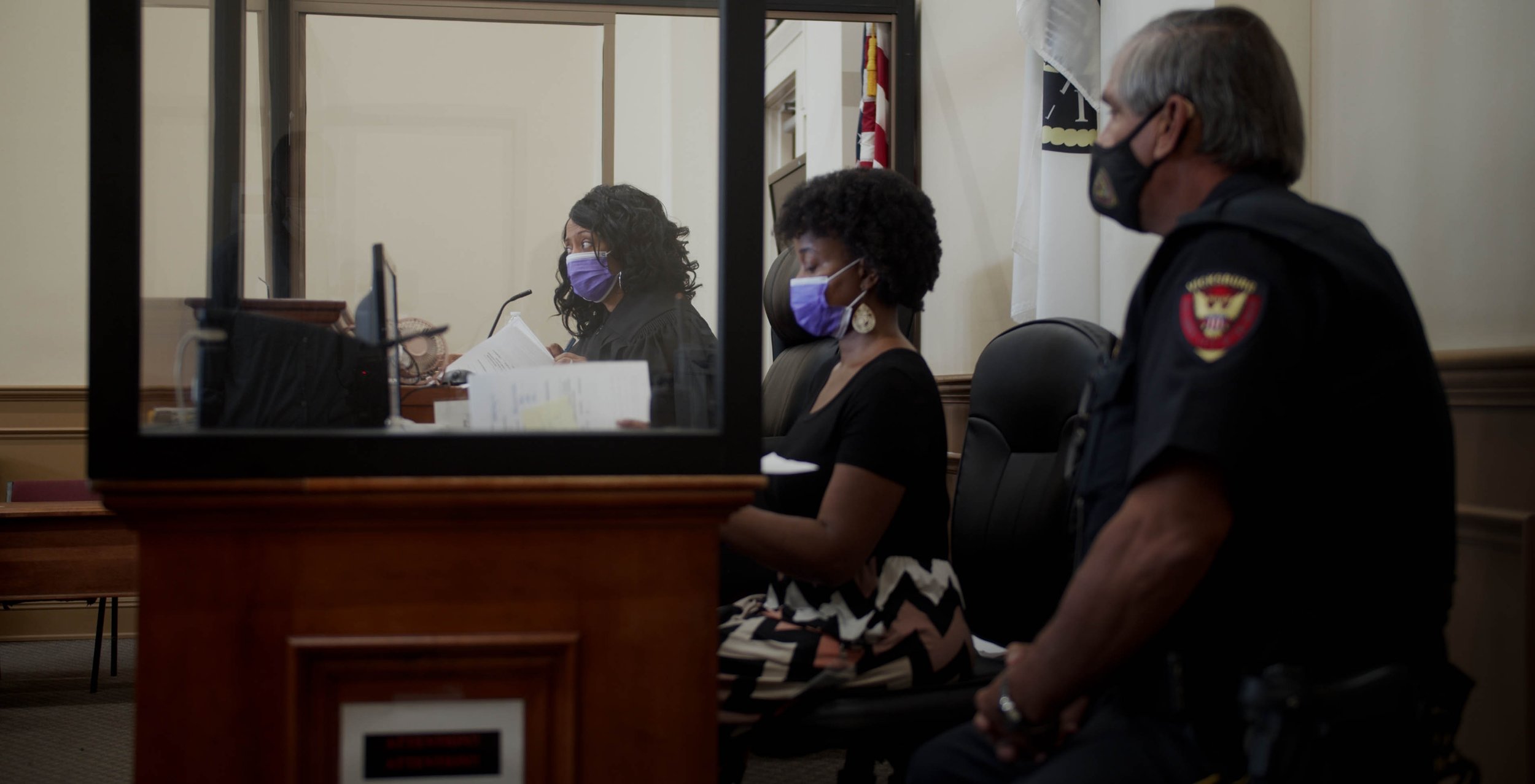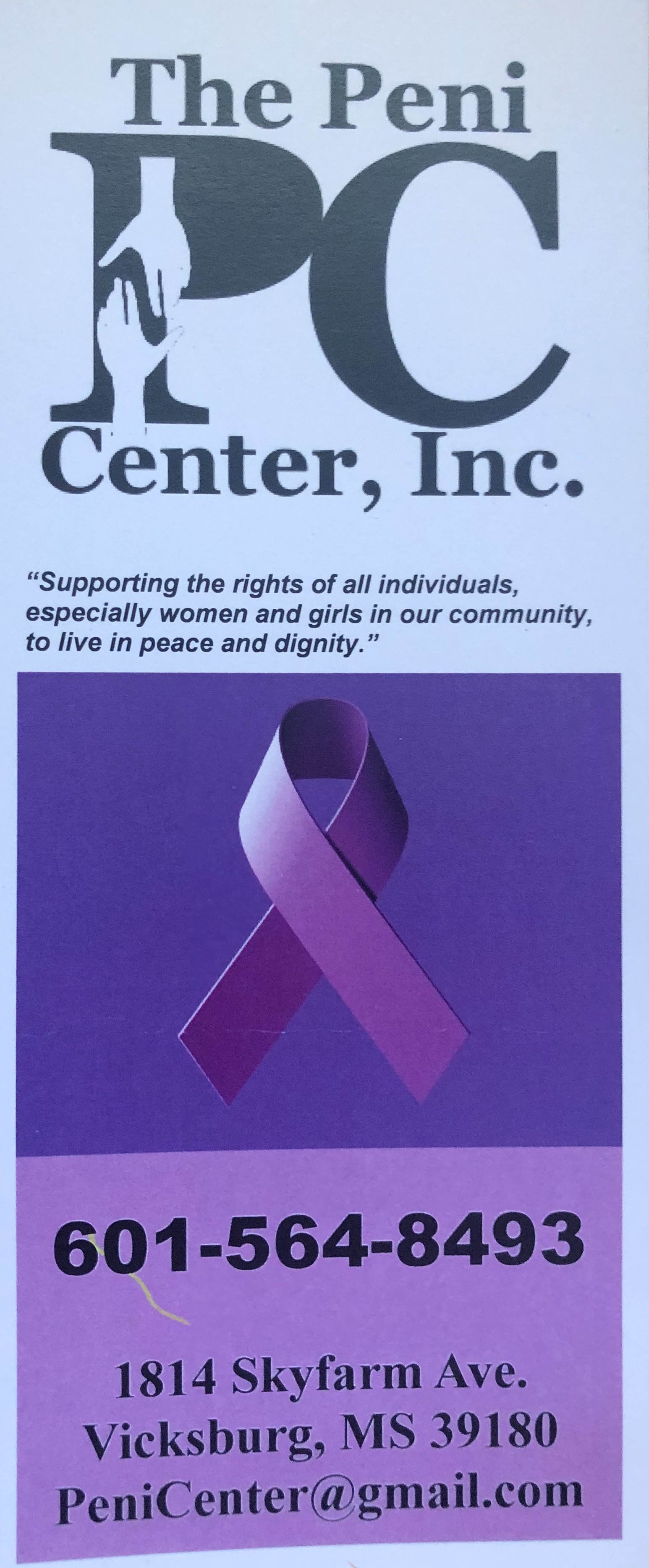‘You Don’t Know How Long 11 Minutes Is’: What People Don’t Know About Domestic Violence
Angela Carpenter is a municipal court judge in Vicksburg, Mississippi. Twice a month on Tuesday afternoons, she presides over domestic violence court. She doesn’t want members of the public, who might be called to serve on juries or grand juries, to dismiss domestic violence cases with a shrug: Why didn’t she just leave??
Every October, Domestic Violence Awareness Month, Judge Carpenter wears purple under her judicial robes and, these days because of COVID-19, a purple medical mask. She also organizes a conference, free to anyone, to teach people about the complicated nature of domestic violence: why victims may not call the police, not leave abusers, not want to appear in court or even press charges at all. The conference and domestic violence court are part of Vicksburg’s Beverly Prentiss Domestic Violence Victim Empowerment Program.
Judge Angela Carpenter presides over domestic violence court last month in Vicksburg, Miss. At right are Deputy Court Clerk Roslyn Gates and bailiff Lt. Claude Billings. Blair Ballou/MCIR
This year, Vicksburg Mayor George Flaggs Jr., opened Carpenter’s conference by praising “the great sense of collaboration to raise awareness about domestic violence in this community. It had been shocking to me to learn that a victim may report violence seven times” before separating from an abuser. He also thought people had to understand that often “domestic violence is progressive,” starting with control and verbal abuse of a victim. Sometimes a simple threat of violence is enough to subjugate a victim.
Survivor Marilyn Ragan Bradford said that when she was engaged around a half dozen years ago, her fiance, whom she’d known for 18 months, had never threatened or hurt her. Bradford was introduced as “a domestic violence victim who has moved to victory.”
One day just before Christmas, Bradford, who was living with her fiance, had to phone her ex-husband about a check she’d received for money that belonged to him.
Her fiance asked her how long she had spent talking to her ex.
“Oh, a few minutes,” she said.
Without telling Bradford, her fiance obtained her phone records and discovered her call to her ex had lasted 11 minutes.
The day after Christmas, he went to work, but returned home about a quarter of an hour later. Bradford was waiting for her daughter; the two women were going to help her aunt move.
Her fiance told her, “I think you’re trying to go back to him.” He forced her to accompany him to an abandoned house, where he shook her by her hair and hit her twice in the face, cracking a bone: “I saw stars.” Then he drove her to a remote reservoir, saying “This is where they’re going to find your body.” But there were too many cars at the reservoir, so he took her back to their home in Vicksburg, “beating me all the way in the head, chest, stomach.”
In their bedroom, he said, “You don’t know how long 11 minutes is. So I’m going to stab you for 11 minutes.”
As he began cutting her, Bradford did not fight back, pleading with him instead. The couple had attended church together, so she cried, “You’re a man of God. Please stop!”
In addition to fear, trauma and pain, Bradford said she felt terrible shame and embarrassment. “You’re so traumatized, you don’t know what to do or whom to trust.” Like too many victims, she thought she had brought this horrendous treatment on herself.
Around 1 a.m. on Dec. 27, her fiance made her take off all her clothes, and lie bleeding on their bedroom floor. He stomped on her stomach and kicked her. Finally he ordered her to get into bed and hold him. All night long, “I thought I was going to die,” she recalled.
In the morning, he instructed her, “Get up, get dressed, go clean your face” and drive him to a store to buy cigarettes. Meanwhile, her family had been calling, looking for her. He told callers she had left for a meeting in Los Angeles. Bradford worked as the manager of a beauty supply store, so her family knew she would never make that kind of trip.
Her nephew worked with the Vicksburg Police Department and said to Bradford’s family, “I told you; I know him better than you do.” He had spotted clues to the fiance’s true nature that Bradford and her relatives had missed. At her family’s request, a police officer knocked on the couple’s door. Her fiance did not answer. Her nephew stopped by. Bradford’s fiance told him she was sleeping.
Her nephew insisted, “I need to see her for myself.”
When he found her, he said, “What do you want me to do?”
Bradford replied, “Get me out of here.”
Vicksburg Police Chief Penny Jones founded the nonprofit Peni Center to help survivors of domestic violence learn skills like balancing a checkbook and finding a job.
Her nephew helped her to his car, and drove her to Haven House, Vicksburg’s shelter. Without the help she found there, Bradford said, “I wouldn’t be here today.” Physically, she was bleeding internally; mentally and emotionally, she was suicidal. But she did get help; she didn’t wait to be abused seven times.
Today, Bradford has “a better job” in a bank, and plans to interview for an even higher-paying one. She has been married for five years to a man she describes as “my best friend; we pray nightly together.” When Vicksburg Police Chief Penny Jones asked her to speak at Carpenter’s conference, she accepted immediately: “It’s my ministry now” to speak publicly about her hair-raising experiences as part of her recovery, and to help others understand.
Chief Jones, a survivor, added that so many victims don’t know how to get help: “You got a pot on the stove, and you don’t know it’s hot until you stick your finger in it.” Jones has her own nonprofit, The Peni Center, which helps victims of domestic violence with self-defense, job hunting and financial skills, and even low-income housing.
Social worker Linda Sweezer, another survivor who now counsels abusers, said friends who aren’t victims can be like Bradford’s nephew: “You can say, ‘I’ve got to see her.’ Or if you see a friend with bruises, tell police or a counselor. We have to just push each other sometimes” to have “zero-tolerance for violence in a relationship.” A woman who is saying “He loves me; that’s why he’s jealous” -- like Bradford’s fiance -- doesn’t recognize that extreme jealousy is an abuser’s form of controlling his victim.
All speakers at the conference can be seen and heard on YouTube.
Read Next: These Women Make A Difference For Domestic Violence Victims Who Like Them Are Most Often Black
Ann Marie Cunningham is a Columbia University Lipman Fellow for 2020 who will be working with the Mississippi Center for investigative Reporting. She is a veteran journalist/producer and author of a best-seller. Her work has appeared in The New York Times, Los Angeles Times, Technology Review, The Nation and The New Republic. Contact her at amc@mississippicir.org.



